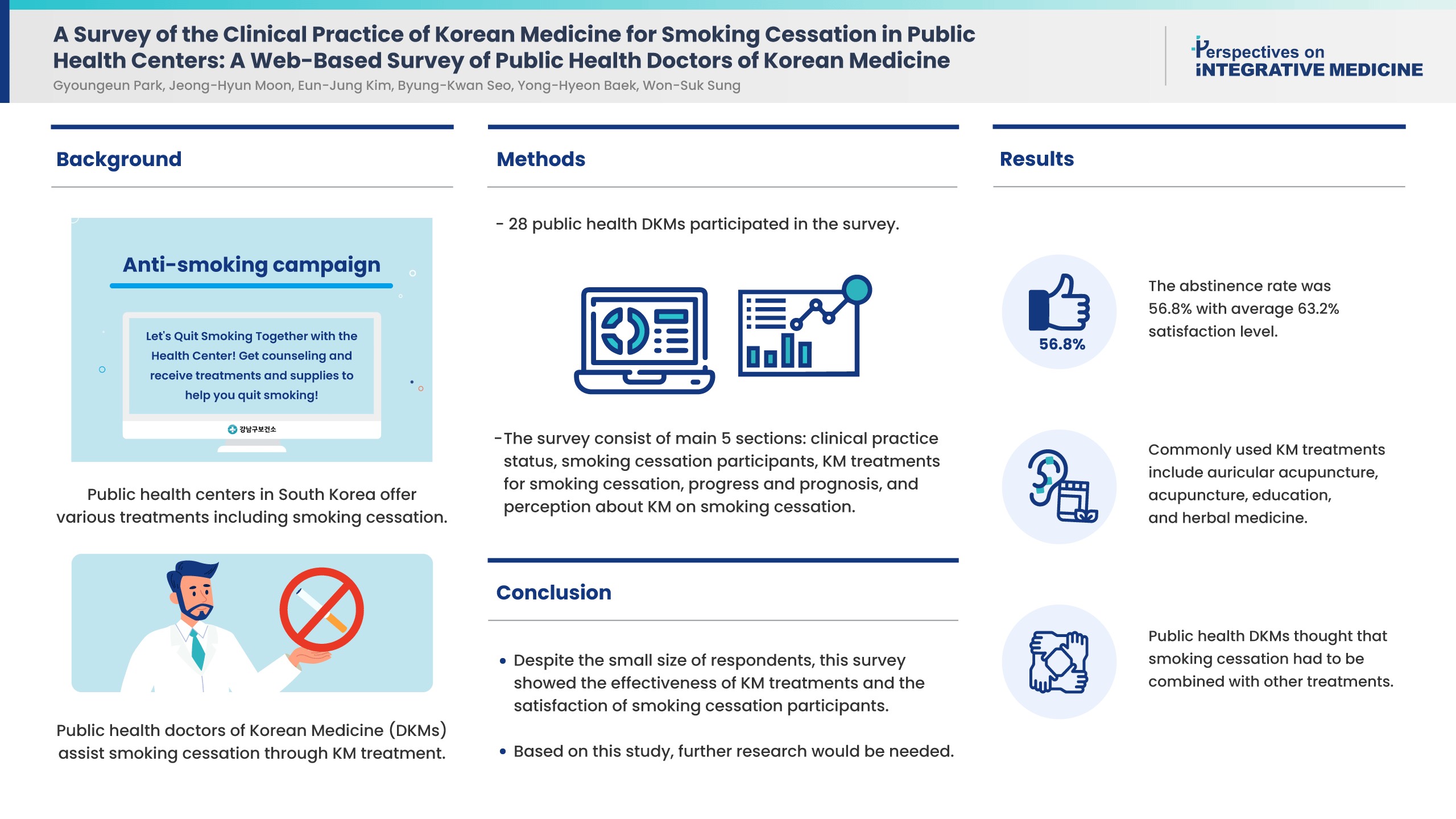- A Survey of the Clinical Practice of Korean Medicine for Smoking Cessation in Public Health Centers: A Web-Based Survey of Public Health Doctors of Korean Medicine
-
Gyoungeun Park, Jeong-Hyun Moon, Eun-Jung Kim, Byung-Kwan Seo, Yong-Hyeon Baek, Won-Suk Sung
-
Perspect Integr Med. 2024;3(1):45-50. Published online February 22, 2024
-
DOI: https://doi.org/10.56986/pim.2024.02.006
-
-
 Graphical Abstract Graphical Abstract
 Abstract Abstract
 PDF PDF Supplementary Material Supplementary Material
 - Background
In South Korea, public health centers provide smoking cessation (SC) treatments including behavioral therapy and nicotine replacement treatment. Also, public health doctors of Korean medicine (PHDKMs) are providing Korean Medicine (KM) treatments. Several studies have reported the clinical usefulness of KM treatment, but in this study, the opinion of PHDKMs was explored to examine the current KM treatments for SC.
Methods
A web-based survey (Moaform) of the treatment for SC by PHDKMs consisted of 5 main sections including clinical practice status, SC participants, KM treatments for SC, progress and prognosis, and perception of KM. The survey was emailed twice to 621 PHDKMs on April 6 to 20, 2022. The frequencies and percentages of each question were calculated.
Results
There were 28 PHDKMs who participated in the survey. Among them, over 90% of PHDKMs had treated ≤ 10 SC participants, and about 10% of PHDKMs had treated 11-20 participants. The abstinence rate was 56.8% with an average 63.2% level of satisfaction in the treatment. Typically used, and recognized as important KM treatments, were auricular acupuncture, acupuncture, education, and herbal medicine. While auricular acupuncture and education were perceived as convenient KM treatment, PHDKMs thought that SC could not be achieved with KM treatment alone and needed be combined with other treatments.
Conclusion
This survey showed the effectiveness of KM treatments with withdrawal symptoms, and treatment satisfaction of SC participants. Respondents also thought that KM treatment combined with other treatments is more effective than KM monotherapy. Based on this small study, further research would be needed.
- Effectiveness and Safety of Duantengyimu-tang for Rheumatoid Arthritis: A Protocol for a Systematic Review and Meta-Analysis
-
Gyoungeun Park, Jeong-Hyun Moon, Eun-Jung Kim, Won-Suk Sung
-
Perspect Integr Med. 2023;2(2):134-137. Published online June 23, 2023
-
DOI: https://doi.org/10.56986/pim.2023.06.009
-
-
 Abstract Abstract
 PDF PDF
- Background
Per-oral pharmacological medication is a representative treatment for rheumatoid arthritis (RA), and has improved over several guidelines. However, limitations of long-term use of these medications including adverse events, led to the introduction and utilization of complementary and alternative treatments for RA. Several herbal medicine decoctions have been reported to be effective and safe; a recent study introduced Duantengyimu-tang (DTYMT). Regardless of the pharmacological effects of the DTYMT components, there are concerns about its safety. Therefore, this systematic review (SR) will focus on the effectiveness and safety of DTYMT treatment for RA.
Methods
Searches for randomized controlled trials using DTYMT treatment for RA will be performed using multiple electronic databases, manual searches, and emails (if necessary). A summary will be written using data on outcome measurements of the study participants, interventions, adverse events, and risk of bias in the studies. The primary outcomes will be disease activity scores including effective rate, tender joints, swollen joints, and morning stiffness. The secondary outcomes will include adverse events and blood tests for RA (erythrocyte sedimentation rate, C-reactive protein, and rheumatoid factors). This SR will use Review Manager software to perform a meta-analysis, the Cochrane Collaboration “risk of bias” tool, and determine the quality of evidence using the Grades of Recommendation, Assessment, Development, and Evaluation method.
Results
This SR will investigate the clinical effectiveness and safety of DTYMT treatment in patients with RA.
Conclusion
This SR aims to be informative for patients and clinicians in clinical practice, researchers, and policymakers in managing RA.
|